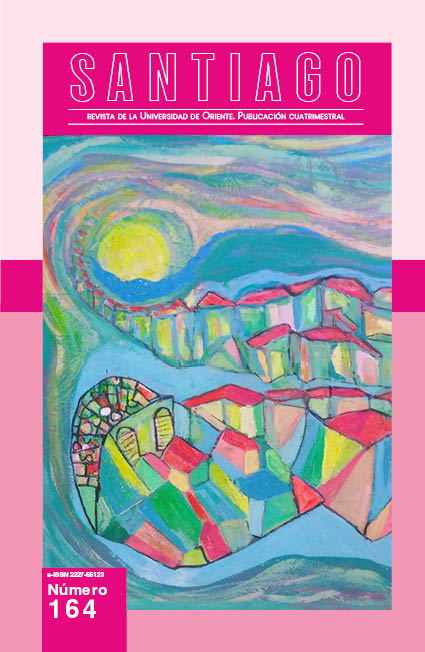Teaching self-efficacy in university professors: a case study
Keywords:
teacher self-efficacy, university teacher, teaching competencies, self-perception of teaching competence, effective teacherAbstract
The research was aimed at characterizing teaching self-efficacy in professors of the Department of Accounting and Finance of the Faculty of Economic and Business Sciences of the Universidad de Oriente, Cuba. The study was based on a qualitative approach with a phenomenological design. The techniques used were semi-structured interviews, documentary analysis, composition and in-depth interviews, and purposive sampling was used in the diverse sampling modality. The constructive-interpretative process of the data was carried out through triangulation and content analysis. It was found that the judgments of teaching self-efficacy of the professors of Accounting and Finance are based on the self-knowledge of their potentialities and insufficiencies for performance; as well as in the mastery of the characteristics of the different functions that are considered for professional performance at the Universidad de Oriente.
References
Bueno-Álvarez, J.-A., Martín-Martín, M. ., y Asensio-Muñoz, I. (2022). Sentimiento de Autoeficacia en Futuros Docentes: Revisión Sistemática en Iberoamérica 2015-2021 . REICE. Revista Iberoamericana Sobre Calidad, Eficacia Y Cambio En Educación, 20(4). https://doi.org/10.15366/reice2022.20.4.002
Hernández, L. y Ceniceros, D. (2018) Autoeficacia docente y desempeño docente, ¿una relación entre variables? Innovación Educativa, 18(78), 171-192.
Hernández, S., Fernández, C., y Baptista, L. (2014). Metodología de la Investigación (sexta edición ed.). México DF.
Matienzo, E. (2016) Las creencias de autoeficacia en el desempeño docente: una mirada desde profesores de la Enseñanza Técnica-Profesional [Tesis de pregrado, Universidad Central “Marta Abreu” de Las Villas].
Prieto, L. (2016). Autoeficacia del profesor universitario. Eficacia percibida y prácrica docente. (2da edición). Alfaomega Grupo Editor, S.A. de C.V.
Santos, A., y Inácio, A. (2021). Mensuração de crenças de autoeficácia docente: revisão de literatura. Interação em Psicologia, 25(3). doi:http://dx.doi.org/10.5380/riep.v25i3.68816
Tschannen-Moran, M., Woolfolk Hoy, A., y Hoy, W. K. (1998). Teacher efficacy: Its meaning and measure. Review of Educational Research, 68, 202–248.
Tschannen-Moran, M., y Woolfolk, A. (2001). Teacher efficacy: capturing an elusive construct. Teaching and Teacher Education, 17, 783-805. http://mxtsch.people.wm.edu/Scholarship/TATE_TSECapturingAnElusiveConstruct.pdf
Vega, Y., y Vizcaíno, A. E. (2023). Evaluación de la autoeficacia del docente universitario: una revisión sistemática de la literatura. Mendive. Revista De Educación, 21(3), e3193. https://mendive.upr.edu.cu/index.php/MendiveUPR/article/view/3193
Yuste, L. (2015). Creencias de autoeficacia docente en estudiantes de Magisterio: Análisis de su relación con variables de personalidad y bienestar psicológico y estudio del cambio. [Tesis doctoral. Universidad de Valencia].
Downloads
Published
Issue
Section
License
Copyright (c) 2024 Yisel Vega-Rodríguez, Rayda Margarita Dussú-Contreras, Melissa Landa-Labrada

This work is licensed under a Creative Commons Attribution-NonCommercial-NoDerivatives 4.0 International License.
CC Reconocimiento-NoComercial-SinObrasDerivadas 4.0



.jpg)

_de_logo.jpg)













